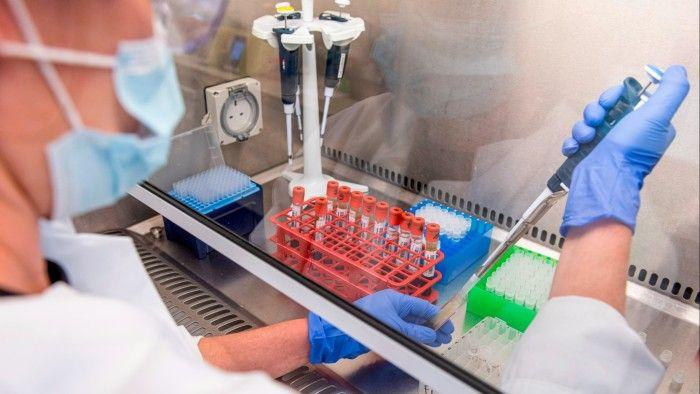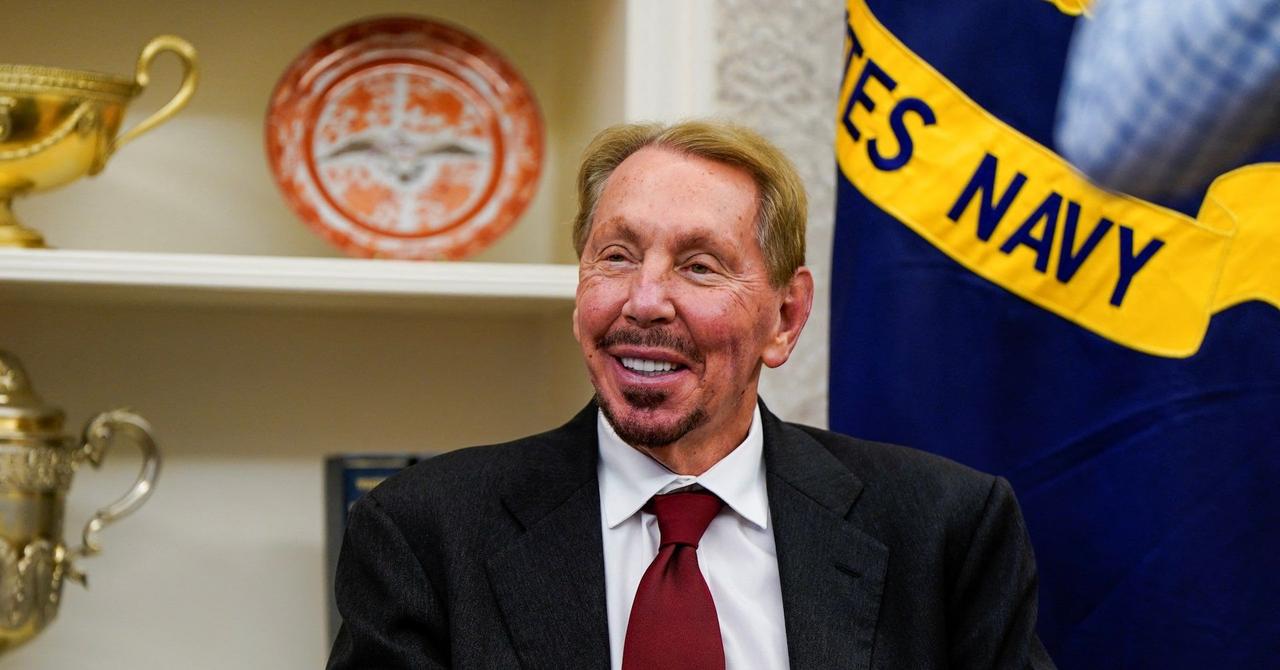Larry Ellison's £118M AI-Powered Vaccine Research Initiative at Oxford University
2 Sources
2 Sources
[1]
Larry Ellison bankrolling £118M vaccine research at Oxford
Oracle billionaire funds project to predict immunity and develop treatments for hard-to-prevent diseases A research group funded by tech billionaire Larry Ellison is set to invest £118 million ($169.6 million) in applying AI to vaccine research with the UK's Oxford University. Oxford Vaccine Group is leading the project to study the human immune system's response to serious bacterial infections and antibiotic resistance, targeting diseases including Streptococcus pneumoniae, Staphylococcus aureus, and E. coli. Led by Professor Sir Andrew Pollard, who ran the trials for COVID-19 vaccines, the project plans to employ so-called human challenge models - which expose human volunteers to bacteria under controlled conditions - then apply modern immunology and AI tools to pinpoint the immune responses that predict protection. "This program addresses one of the most urgent problems in infectious disease by helping us to understand immunity more deeply to develop innovative vaccines against deadly diseases that have so far evaded our attempts at prevention," Pollard said. "By combining advanced immunology with artificial intelligence, and using human challenge models to study diseases, CoI-AI [Correlates of Immunity-Artificial Intelligence] will provide the tools we need to tackle serious infections and reduce the growing threat of antibiotic resistance. This is a new frontier in vaccine science." Established in 2023, the Ellison Institute of Technology (EIT) aims to open its Oxford campus in 2027 following an investment of around £1 billion. It is set to provide research labs and computing capacity supported by Oracle, which Ellison helped found. In December 2024, the University of Oxford and the EIT launched their strategic alliance. Ellison has long voiced an interest in healthcare. During the keynote of Oracle's conference in 2022, he said: "If we're not careful... we're gonna bankrupt Western civilization unless we find a more efficient way of providing healthcare to everybody." In 2020, Ellison is said to have contributed to the early US response to the COVID-19 pandemic during President Donald Trump's first term. Ellison continues to be close to US government projects, and remains a contributor to the $500 billion Stargate project, which aims to build a network of AI datacenters around the globe. However, the current US administration has attracted criticism for its approach to vaccines. In August, the US Department of Health and Human Services said it planned to cancel $500 million in funding for mRNA vaccines, which promise to protect against viruses that cause flu and COVID-19. Speaking to the Financial Times, Oxford Vaccine Group's Pollard said there was "huge concern" that the debate on vaccines in the US was threatening vaccines that protect millions of children's lives. "One of the greatest tools ever is being undermined by poor science and misinformation," he told the publication. ®
[2]
Oracle billionaire's institute gives Oxford major grant for AI vaccine research
Oracle billionaire Larry Ellison's institute of technology is funding a first-of-its-kind project to use artificial intelligence for research into vaccines that will protect against the world's most dangerous pathogens, in one of the largest grants that Oxford university has ever received. The Ellison Institute of Technology is giving £118mn to fund the Oxford Vaccine Group's five-year project led by Professor Sir Andrew Pollard, who ran the trials of the Oxford/AstraZeneca Covid-19 vaccine. The group, part of Oxford university's paediatrics department, will use the funding for "human challenge" trials -- where participants are deliberately infected under controlled conditions -- to improve our understanding of how the immune system responds to bacteria that antibiotics sometimes fail to treat. Pollard said the grant was a "unique investment in UK universities", which need commercial enterprises such as biotechnology companies to back their science. "This is a great example of the recognition by the others, by the Institute, of the type of work that you can do in British universities that we need to encourage for the future of the sector," he told the Financial Times. The funding will bolster the UK's pioneering work in vaccine research to help tackle antimicrobial resistance that scientists forecast will cause 39mn deaths globally in the next 25 years. The Ellison Institute of Technology is due to fully open its £1bn-plus Oxford campus in 2027. The facility will directly employ thousands of scientists in 30,000 square metres of research laboratories and computing capacity enabled by Ellison's technology company Oracle. It was first established in late 2023. It aims to work on "commercially sustainable solutions" to some of the world's biggest challenges, including in health, clean energy and food security, and will eventually plan to spin off companies. Daniela Ferreira, a professor who is jointly leading the project with Pollard, said the EIT grant was essential to being able to conduct the studies at an unprecedented scale, recruiting more people than ever to the trials. EIT's experts in AI will work alongside the UK's world-leading specialists in human challenge trials. "It's almost like a 20-year programme in four or five [years] because we can massively accelerate the whole programme by [combining] the expertise together with EIT and Oxford," she said. The project will tackle pathogens such as E. coli, Streptococcus pneumoniae, and Staphylococcus aureus, which scientists have tried and failed for decades to make vaccines to protect against. Pollard said only about one in 20 vaccine research projects are successful, even though vaccine candidates often look promising in animal studies, because there are big differences between how the immune systems of mice and humans operate. The trials will collect large amounts of data on how human bodies respond as they are exposed to the pathogens, including blood samples and tissue from the lymph nodes, a key part of the immune system. By using AI to process this data, the scientists hope they will understand more about the best tactics participants' immune systems employ when battling the bacteria. Those insights will help with selecting the right part of the bacterium to mimic in a vaccine. Investors are shying away from vaccine research, after the US appointed Robert F Kennedy, a vaccine sceptic, to oversee health policy. Earlier this month, Kennedy cancelled a £500mn grant for research into vaccines using messengerRNA, a technology used in the bestselling Covid-19 shots. Pollard said there was "huge concern" that the "dialogue" in the US was threatening vaccines that protect millions of children's lives. "One of the greatest tools ever is being undermined by poor science and misinformation," he added.
Share
Share
Copy Link
Oracle billionaire Larry Ellison's Ellison Institute of Technology is funding a groundbreaking £118 million project at Oxford University to use AI in vaccine research, targeting antibiotic-resistant bacteria and hard-to-prevent diseases.
Ellison's Massive Investment in AI-Powered Vaccine Research
Oracle billionaire Larry Ellison is set to invest £118 million ($169.6 million) in a groundbreaking project that combines artificial intelligence with vaccine research at the UK's Oxford University. The Ellison Institute of Technology (EIT) is funding this five-year initiative led by the Oxford Vaccine Group, aiming to tackle some of the world's most dangerous pathogens and address the growing threat of antibiotic resistance
1
2
.Project Overview and Objectives
The research, spearheaded by Professor Sir Andrew Pollard, who previously led the trials for COVID-19 vaccines, will focus on studying the human immune system's response to serious bacterial infections. The project targets diseases caused by bacteria such as Streptococcus pneumoniae, Staphylococcus aureus, and E. coli, which have long eluded successful vaccine development
1
.Professor Daniela Ferreira, co-leader of the project, emphasized the unprecedented scale of the studies, stating, "It's almost like a 20-year programme in four or five [years] because we can massively accelerate the whole programme by [combining] the expertise together with EIT and Oxford"
2
.Innovative Approach: Human Challenge Models and AI

Source: FT
A key aspect of this research is the use of "human challenge models," which involve exposing human volunteers to bacteria under controlled conditions. This approach, combined with advanced immunology and AI tools, aims to pinpoint the immune responses that predict protection against these hard-to-prevent diseases
1
.The trials will collect extensive data on how human bodies respond to pathogens, including blood samples and tissue from lymph nodes. AI will be employed to process this data, helping scientists understand the most effective tactics used by participants' immune systems when fighting bacteria. These insights will be crucial in selecting the right parts of bacteria to mimic in future vaccines
2
.The Ellison Institute of Technology's Role
Established in 2023, the EIT is set to open its Oxford campus in 2027 following an investment of around £1 billion. This facility will provide research laboratories and computing capacity supported by Oracle, which Ellison co-founded. The institute aims to work on "commercially sustainable solutions" to global challenges in health, clean energy, and food security
1
2
.Related Stories
Broader Context and Challenges

Source: The Register
This significant investment comes at a time when vaccine research faces challenges in the United States. The current US administration has attracted criticism for its approach to vaccines, with plans to cancel $500 million in funding for mRNA vaccines that could protect against flu and COVID-19
1
.Professor Pollard expressed concern about the impact of misinformation on vaccine acceptance, stating, "One of the greatest tools ever is being undermined by poor science and misinformation"
1
2
.Future Implications
The collaboration between EIT and Oxford University represents a new frontier in vaccine science. By combining advanced immunology with artificial intelligence and using human challenge models, the project aims to provide the tools needed to tackle serious infections and reduce the growing threat of antibiotic resistance
1
.This initiative not only highlights the potential of AI in medical research but also demonstrates the crucial role of private funding in advancing scientific endeavors. As antimicrobial resistance continues to pose a significant global health threat, projects like this offer hope for developing innovative solutions to protect public health in the coming decades
2
.References
Summarized by
Navi
[1]
Related Stories
AI-Powered Cancer Vaccines: Oracle's Larry Ellison Unveils 48-Hour Personalized Treatment
22 Jan 2025•Health

Larry Ellison Advocates for Unified National Data to Power AI Systems
13 Feb 2025•Policy and Regulation

Larry Ellison's AI-Powered Resurgence: Oracle Co-Founder Briefly Becomes World's Richest Person
10 Sept 2025•Business and Economy

Recent Highlights
1
Samsung unveils Galaxy S26 lineup with Privacy Display tech and expanded AI capabilities
Technology

2
Anthropic refuses Pentagon's ultimatum over AI use in mass surveillance and autonomous weapons
Policy and Regulation

3
AI models deploy nuclear weapons in 95% of war games, raising alarm over military use
Science and Research





